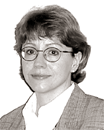 |
 Paula
Boyer Kennedy is a senior manager and practice leader in the
Minneapolis office of Ernst & Young LLP. Her clients are primarily
Fortune 100 companies and their employees. Paula
Boyer Kennedy is a senior manager and practice leader in the
Minneapolis office of Ernst & Young LLP. Her clients are primarily
Fortune 100 companies and their employees.
Paula is a Certified Public Accountant and Personal Financial
Specialist and also holds the Certified Financial Planner
(CFP) and Certified Investment Management Analyst (CIMA) designations.
Paula received her BA in English from Cornell University's
College of Arts and Sciences in 1978 and her MBA in Finance
and Accounting from Cornell's Johnson Graduate School of Management
in 1980.
Paula was recognized as one of Worth magazine's 250 best
financial planners in America in 1999. She was profiled in
the Spring, 1999 issue of Cornell Enterprise and the September,
1998 issue of Dow Jones Investment Advisor. Paula is a contributor
to the PBS show, Right on the Money, has been featured on
CNN, radio and online chat forums, and has been quoted in
such publications as Woman's Day, Working Mother, and Parents.
Paula is past Chairman and President of the Central New Jersey
Society of the Institute of Certified Financial Planners.
She has served on the ICFP's National Technology Committee.
She has also served on boards for the Amateur Computer Group
of New Jersey, the Trenton Computer Festival, and the Baldwin
School.
- What led you to write this book?
I wrote this book with five Ernst & Young women colleagues. We all feel
that women face greater financial challenges than men. We live longer, we
earn less, and we may take time off to care for family. We wanted to
write the kind of book we ourselves would like to read.
- What do you feel to be the biggest challenge facing women today when
handling their finances?
For all kinds of reasons, we tend not to accumulate pension benefits the
way that men do. That means that saving for retirement is a greater
challenge for us.
- How has the atmosphere changed for women investors in the last 10
years?
We're getting a lot more respect.
- How will the atmosphere change for women investors in the next 10
years?
We'll get even more respect.
- Where did you start your career and how did it lead you to where you
are today?
My interest in financial planning came about through a family crisis. My
parents were small business owners, running a boys camp in New Hampshire.
Not understanding the value of the land upon which the camp stood, my
parents did no financial planning, relying instead on simple wills to pass
their money to their children. The estate was grossly mishandled, and,
thirteen years after the death of my mother, who died five years after my
father, it is still in litigation with the IRS.
By the time the estate is finally settled, in perhaps a year or two, there
won't be any money left. What my parents worked so hard for all their lives
will have gone to taxes and attorneys. That experience has driven me to
become a financial planner. I never want another family to go through what
mine has.
- How much money do you need to start investing?
Mutual funds can have minimums as low as $100.
- How should a woman get started investing with no investment
experience?
First, she needs to define her goals.
Then she needs to look at the time horizon. How long until she needs the
money she's investing? If it's for a car in 18 months, she will want to
stay in things like CDs and money market funds. If it's for retirement in
20 years, she will want to have money in the stock market, for growth.
Then she needs to understand her ability to tolerate financial risk.
Next she should develop an asset allocation (% of money in stocks, bonds,
cash) that fits her goals, time horizon and risk tolerance. Many mutual
funds companies have websites that test risk tolerance and suggest asset
allocations.
Then she needs to buy. She might want to start with a large company stock
fund (the S&P 500 is the index for large company stocks), and then build
her allocation from there.
After that, she should monitor her investments. Once a year or so, she
should sit down and take a look at what she has, and adjust her investments
to get back to her target percentages.
- If a woman has debt, at what point should she become an investor?
When the interest rate she can expect to earn (net of taxes) on her
investments is greater than the interest rate she pays (net of taxes) on
her debt. That means that mortgage debt is generally OK to have, but
credit card debt is usually not.
- Have you published any other books before this one? If so, what are
they?
I have written some guidebooks for clients, but this is my first published
book.
- What are your future book writing plans?
None at present. But you never know.
|
|
